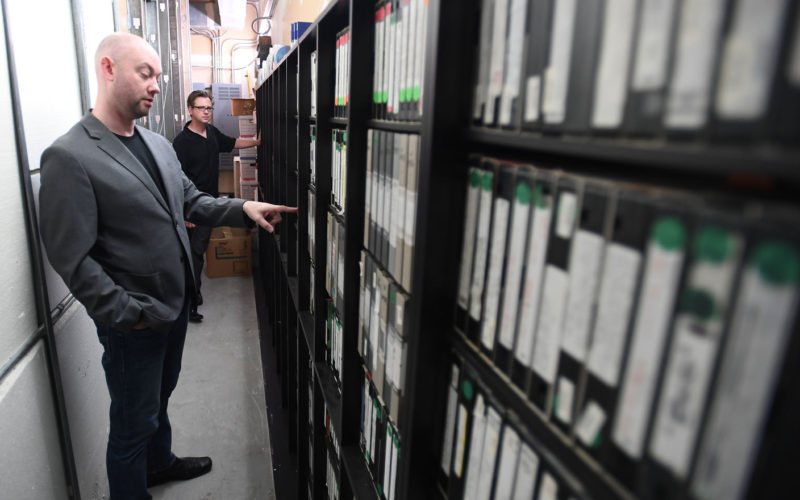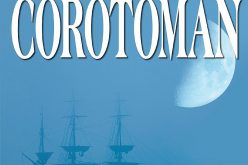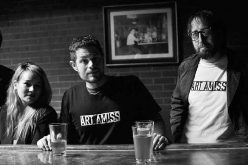Fayetteville public access shows going online
STACY RYBURN
sryburn@nwadg.com
For anyone who used Fayetteville’s public-access station in the 1990s to host a comedy show, display a performance art piece or set the record straight with an open mic, there’s a tape for that.
Fayetteville Public Television is setting forth on a course to digitally archive all of it.
It’s an idea that has come up in the past but hasn’t been feasible until recently, said Doug Bankston, the city’s director of media services. The station began upgrading equipment over the last few years, and about a year ago, installed a digitization archiving station.
The city contracts with the nonprofit corporation Your Media to oversee the public-access service. The contract for this year was for $165,779, according to city records.
The city’s five-year capital improvement plan has $250,000 put toward the station covering the purchase, replacement and maintenance of equipment. Annual spending amounts fluctuate based on need, Bankston said.
In 2016, the station completed a $250,000 overhaul of the studio to convert it to all digital equipment, which was separate from its regular capital budget.
The archiving station the studio has is a computer with decks for VHS tapes and DVDs. The process to digitize DVDs can be relatively easy — just rip the disc and create a file. For tapes, however, someone has to sit and watch every minute of content as the computer records.
About 2,000 tapes line the shelves of the station’s library.
The station is depending on the goodwill of volunteers to get the job done, said Dan Robinson, operational manager for Fayetteville Public Television.
“Just reading through the titles is comical,” Robinson said. “It’s the kind of stuff you would totally expect to come out of Fayetteville, and totally expect to come out of a public-access channel.”
For instance, one tape features “The History of Trees, Part I.” Somewhere out there is a Part II.
A notable program, “One Whirled View,” aired more than 450 episodes, featuring resident Roger Henry and his funny hat.
Stephen Smith, who served on the station’s board when it was the Fayetteville Open Channel in the 1980s, said he was glad to hear of the archiving effort. Public-access TV in the city has gone through a few iterations at different locations, and in the process some material has been lost, never to be recovered, he said.
Knowing there are tapes covering more than a decades’ worth of content means there’s a reliable record of what was going on at the city at the time, Smith said. Searching through the archives online could be akin to time-traveling, he said.
“It was really fairly active. This was before everybody had home computers and YouTube and Facebook and everything,” he said. “It was really a first-publishers type of thing, and it was really popular.”
The station wanted to archive the programs digitally because the tapes deteriorate over time, Bankston said. A separate, yearlong effort to digitize hundreds of hours of local government and public meetings dating to the early ’90s just wrapped. About 90% of the material was salvaged, Bankston said.
“You get sucked into this stuff. You’re watching history — you’re seeing people 20, 25 years ago,” he said. “Whenever you pull something, that’s like a historical snapshot of what was happening in Fayetteville at that time.”
The next step for the Government Channel archive project is to categorize the content, plug in metadata and put the videos on the city’s website. There are still DVDs to go through after that, Bankston said.
Archiving the public-access material is going to take years, Robinson said. The 2,000 tapes can have two to six hours of content, depending on how they were recorded.
The station plans to put a sign-up for volunteers on its webpage. Whoever does it will need to watch the tapes as they record and write down information to use for metadata and categorization.
“I believe that once we get it rolling, and people start seeing the crazy, cool content that we’re pulling out of here, that it will create some synergy and activate some of the funkier parts of the community,” Robinson said.
Robinson said chunks of the content will be posted to YouTube as the archiving process moves along. The public will be able to search through it and watch it or download it.
“Glitch artists could use this content and create mixed and multimedia glitch art with it,” Bankston said. “It’ll be free to the public.”
When people record anything at Fayetteville Public Television, they sign a waiver saying the station has the ability to broadcast the content under limited, nonexclusive terms. That applies to the television channel, as well as the station’s YouTube channel, Robinson said. The station treats its YouTube channel the same as its broadcast channel, so the agreement applies to waivers signed before YouTube existed, he said.
As for the tapes, the station will recycle as much of the material as possible, Robinson said. The content will live on hard drives, in addition to YouTube, he said.
“It’s like the home movie collection for the city of Fayetteville,” Robinson said.
__
How To Help
If you’re interested in helping archive Fayetteville Public Television’s content, email info@faypublic.tv or call 444-3433.
__
History Of Station
Fayetteville Open Channel broadcast on Warner Cable’s Channel 2 from 1980-92. In 1993, there was Access 4 Fayetteville, followed by Community Access Television, known as the CAT.
In 2010, the name changed to Fayetteville Public Access Television, and was shorted in 2016 to Fayetteville Public Television.
All of the tapes from the 1980s and most from 1990-92 were lost when Fayetteville Open Channel folded and subsequently didn’t keep up payments to a storage facility in Springdale, where the tapes were housed.
— Source: Staff report






